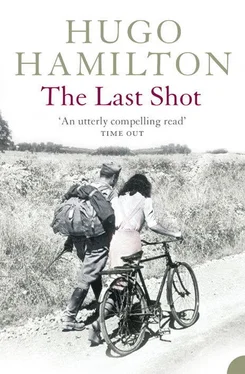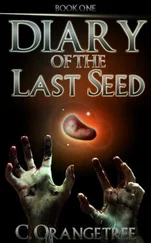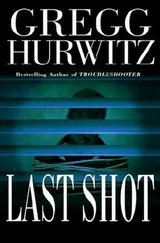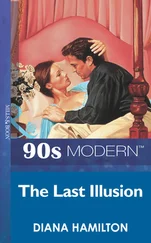After dinner, Jürgen ordered coffee and brandy. The association with the scent of coffee from earlier in the day was renewed. Guilt by scent.
Jürgen spoke up. Quite abruptly, over the brandy, he brought up the subject of Anke and myself as though he had completely forgotten it in the meantime. He hadn’t. He was saving it up. First he toasted, then he stared at both me and Anke alternately. Seriously. A little drunk.
‘I wanted to talk to you both together about this,’ he said. ‘I don’t want to make it a long drawn-out thing. I know how these things happen. I know the strength of love…’
Anke and I looked at each other. We were both completely surprised when it came. It was like an official announcement. I was sure people at the next table were able to hear him. His solemn mood was obvious.
‘I will say to you both very honestly what I think,’ Jürgen went on. ‘I have to say it. I know you are having this affair. I cannot stop it.’
We listened. We had no right to speak.
‘I thought, four years ago, when we came to live here in Münster, that it was all over. When you came to visit, I knew you were coming as a friend. This has hurt me very much. I know there is nothing I can do. You will still remain my best friend, no matter what happens. And I will still love Anke, no matter what happens…’
Jürgen took my hand. Then he took Anke’s hand. It must have looked like a seance. The three of us silent; tears in Jürgen’s eyes. Tears in Anke’s eyes.
‘I love you both so much,’ he said, looking from one to the other. ‘I have thought about this every minute of the day. It has cost me so much pain, but I would hate to lose you…either of you.’
He was drunk. Things got worse. We discussed the whole thing very rationally for a while. Anke made excuses. Something had just snapped inside her, she explained. She put her arms around Jürgen. Her tears mingled with his. I could see that the waiter was making anxious glances. But the Greeks understand this kind of thing. They didn’t interfere. They brought more brandy. I’ve never seen Anke that drunk before.
I told Jürgen ten times over that I was leaving the next day. It was all a big mistake. I vowed to him that I wouldn’t do this to him again. Anke looked distressed. She hung with her arms around Jürgen’s neck.
And Jürgen put his hand on my throat, with my shirt in his fist.
‘I love you… you bastard.’
We walked home together, the three of us arm in arm, Jürgen in the middle, stumbling through the Altstadt of Münster. Sometimes we stopped and put our heads together in the middle of the street. We passed through an archway where the spotlights shine upwards at the old buildings and past the buildings into the reddish-black sky.
I went to Nuremberg.
I began to search for Franz Kern, again, in late November that year. It seemed even more ironic that I should be digging up the end of the war when everybody else was moving so feverishly towards German unity. A new era for Germany. Now it was time at last to drop the Second World War.
I found the old list of Kerns. I had only contacted and ticked off ten Kerns before I gave up. I was surprised at my lack of determination. This time, I would put all discretion aside; I had no intention of being brutal or making old people suffer any more guilt or trauma over the war, but I wanted to know. It was down to sheer curiosity by now.
I booked into a guest-house close to the centre of town this time. Pension Sonne, on the fourth floor, no lift; clean, quiet, run by an old woman, Frau Schellinger, and her daughter. It had a phone in the breakfast-room. Frau Schellinger promised to take messages for me if I was out. She told me later that most of the people she catered for were travelling salesmen and American tourists, like myself. I felt I belonged more to the salesman category.
I told Frau Schellinger that I worked in market research. She seemed pleased. Eager to help. She was officially retired now. Her daughter ran the guest-house and she was only really helping out. I rarely saw the daughter.
By day, I made phone-calls and went up the hill to the library. In the evening I made more calls to those who were not replying during the day. There seemed less of a rush. I was going about this in a more strategic way, like a market survey. I enjoyed the task more, crossing off the Kerns, talking to people about the war. I found another Fritz Kern who had been in Czechoslovakia at the end of the war. But the wrong end. He was captured by the Russians near Jihlava. He spent months in Russia before he was released.
I found a Franz Kern who said he had lost both legs in the Crimea during the war. He said he had been loaded on a truck with other dead soldiers, unconscious, taken for dead. He found himself on top of a stinking communal grave when he managed to shout out and was saved.
I went to meet him in a suburb of Nuremberg one afternoon. It took me ages to find his small, one-room apartment. He had a shiny red face and oiled grey hair. Twice a week, Tuesdays and Fridays, he was brought down to the noisy pub on the ground floor of the same building by his son. They would drink beer and schnapps together and play Skat. He had obviously told his story a hundred times over. He was a happy man, with no deep attitude to the war, just glad to be alive.
His son talked about the German football team. His son was very broad, about five times the size of his father. He was able to lift his father and carry him around. The mother had died some years ago. I asked the son his age. He looked at me in a strange way, silent, as though he knew what I was really asking. If he was born since the war, since the legs were blown away. The father answered, slapping his son on the back, saying, ‘His mother was a beautiful woman.’
They were the only Kerns I could find who would meet me. Most of the Kerns I phoned grunted suspiciously and said they had nothing to do with the war. There was a particular Frau Kern who didn’t know where her husband had been. She dropped the phone and went to ask him. I had this picture of a very old couple, senile, losing all memory, puzzling over the question. It seemed to me that they had lost the memory of the phone ringing, but after a while she did come back and said: Jugoslawien.
I wasn’t having much success but I was being very patient. In the meantime, I had placed a discreet ad in two German newspapers, the Frankfurter Allgemeine and the Nürnberger Nachrichten, leaving a box number. The lady at the reception in the Nuremberg office said that kind of ad was not unusual after the war. She helped me with the wording.
After the phone-calls in the evening, I ticked off the list of Kerns in the breakfast-room, counted the digits I had spent on the phone and went in to pay Frau Schellinger. Occasionally I would see a salesman through the frosted orange glass door, pacing up and down, waiting to use the phone. To phone his wife, I suppose.
I paid Frau Schellinger each evening for the phone-calls. And each evening I would find her sitting in her living-room, or in reception, behind the glass partition. She began to invite me in. I sat down sometimes to talk to her. There was a massive TV in the corner, always on. She talked about reunification.
‘The people over there in the East should know that we didn’t have it easy either,’ she said. She had obviously been thinking about all this, waiting for somebody who would listen.
‘You get nothing for nothing,’ she went on. ‘We all had to work hard for what we have. Every Pfennig, we saved.’
Within minutes she had taken out a coffee-table book showing photographs of the old and the completely restored Nuremberg.
Читать дальше
Конец ознакомительного отрывка
Купить книгу












